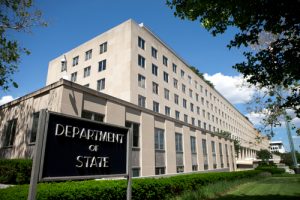
The State Department would be required to periodically submit a National Diplomacy and Development Strategy (NDDS) to Congress under bipartisan legislation introduced by U.S. Sen. Todd Young (R-IN) on Wednesday.
The bill calls for that strategy report to include an assessment of the most important worldwide objectives of the United States and the leading threats, challenges and opportunities linked to those national interests.
The legislation follows a recent Senate Foreign Relations Committee hearing in which Young questioned former National Security Advisor Stephen Hadley and former Secretary of State Madeleine Albright about a statutory requirement for the State Department to develop and submit an NDDS to the committee for review.
Both Hadley and Albright supported the statutory requirement, which is outlined in Young’s legislation. Hadley called it a “terrific idea” and Albright said, “I think it would make a difference.”
“Protecting Americans and promoting our values require effective U.S. diplomacy and international development, yet sometimes these efforts are conducted in relative stovepipes and not sufficiently coordinated across the U.S. government or in support of the National Security Strategy,” Young said.
“In order to inform the efficient allocation of finite resources and to better promote U.S. interests and principles abroad, Congress and the American people are right to expect that the Department of State, working with interagency partners like USAID, establish specific diplomatic and development priorities, objectives, milestones and metrics — while balancing ends and means and identifying risks,” he said.
After introducing the bill with U.S. Sen. Jeanne Shaheen (D-NH) on Wednesday, Young added that strategy should shape major personnel and organizational decisions, “not the other way around.”



